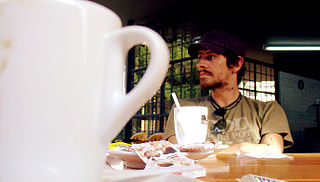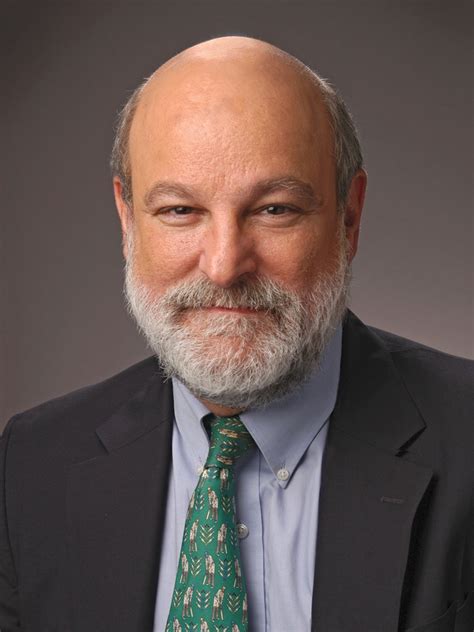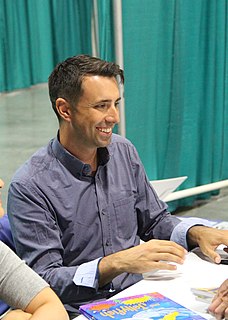A Quote by Gabriel Ba
There are many readers of the book, who don't know anything about the authors and the artists. There is more than one author. It doesn't matter, if you can't make the reader dive into the story and surround him with that environment and those characters. That's an experience that lasts longer than figuring out who did what. I think that's what makes our working relationship better, it helps us to make a book that feels unique and not like different voices.
Quote Topics
Related Quotes
Authors have a greater right than any copyright, though it is generally unacknowledged or disregarded. They have a right to the reader's civility. There are favorable hours for reading a book, as for writing it, and to these the author has a claim. Yet many people think that when they buy a book they buy with it the right to abuse the author.
I know publishing now more as an author than with occasional peaks inside those elite offices than as an industry insider. It was difficult publishing a novel the first time around, while working behind the scenes, knowing all that has to happen to make a book a success and to still make the leap as an author.
A reader is entitled to believe what he or she believes is consonant with the facts of the book. It is not unusual that readers take away something that is spiritually at variance from what I myself experienced. That's not to say readers make up the book they want. We all have to agree on the facts. But readers bring their histories and all sets of longings. A book will pluck the strings of those longings differently among different readers.
My readers have to work with me to create the experience. They have to bring their imaginations to the story. No one sees a book in the same way, no one sees the characters the same way. As a reader you imagine them in your own mind. So, together, as author and reader, we have both created the story.
If I'm writing a story and you're reading it, or vice versa, you took time out of your day to pick up my book. I think the one thing that will kill that relationship is if you feel me condescending to you in the process. And how does that happen? Well, it happens when I know more than you do, and when I know that I know more than you do, and I'm holding it back from you. So that I can then manipulate you at the end. You know, you think about like in a dating situation how terrible that would be, it's the same thing with a book.
When I had finished the book I knew that no matter what Scott did, nor how he behaved, I must know it was like a sickness and be of any help I could to him and try to be a good friend. He had many good, good friends, more than anyone I knew. But I enlisted as one more, whether I could be of any use to him or not. If he could write a book as fine as The Great Gatsby I was sure that he could write an even better one. I did not know Zelda yet, and so I did not know the terrible odds that were against him. But we were to find them out soon enough.
Along the way, about certain things, you realize, "I don't know anything about this." You think, "Is this going to sound ridiculous?" So I pestered more than a hundred different people over the course of the book. And when I finished the book I gave it to six or seven trusted readers, who are always the same, but I also gave it to a brother of mine who's a doctor and I asked him to read it, and he was very helpful. It's good to have a group of trusted readers. As my kids have grown up, they've joined this group.
Make sure your characters are worth spending ten hours with. That’s how long it takes to read a book. Reading a book is like being trapped in a room for ten hours with those characters. Think of your main characters as dinner guests. Would your friends want to spend ten hours with the characters you’ve created? Your characters can be loveable, or they can be evil, but they’d better be compelling. If not, your reader will be bored and leave.
The Bible is not a book like any other. It makes a claim that God spoke and speaks through its message. It argues that as his creatures, we are accountable to him for what he has revealed. The trustworthiness of Scripture points to its authority as well. Scripture is far more than a history book, as good and trustworthy as that history is. It is a book that calls us to examine our lives and relationship to God. Beyond the fascinating history, it contains vital and life-transforming truths about God and us.
My husband, William Sutcliffe, the writer, is my first reader and in many ways my most important. That initial reading of the manuscript is crucial and irreplaceable and you want them to approach it as someone in a bookshop might, not knowing much about it. So I've got into this pattern of not telling Will anything about the book I'm working on. He often knows nothing about the book I'm working on at all until I give him the whole manuscript and ask him to read it. The book I'm working on at the moment he knows nothing about. No one does.
There are authors like David Foster Wallace or Raymond Chandler - with voice-based authors I might end up a completist, because what I love about them isn't just the particular construction of one novel or another but their flavor. There is an Austrian writer, Thomas Bernhard, as well. One book is not necessarily greater than another book, but they just have this incredible, unique voice, so it doesn't really matter which one you read.
In my case, I made the decision early on that I was going to be very open about the book and claim upfront that each of the stories was based on my life experience. I think my reasoning goes back to what I was saying earlier, about wanting the book to be "more than a book," that I wanted the reader to feel a little unsettled about what they were reading: there's a core of factual truth here.
If the book we are reading does not wake us, as with a fist hammering on our skull, why then do we read? So that it shall make us happy? Good God, we should also be happy if we had no books, and such books as make us happy we could, if need be, write ourselves. But what we must have are those books which come upon us like ill fortune, and distress us deeply, like the death of one we love better than ourselves; like suicide. A book must be an ice-axe to break the sea frozen inside us.








































